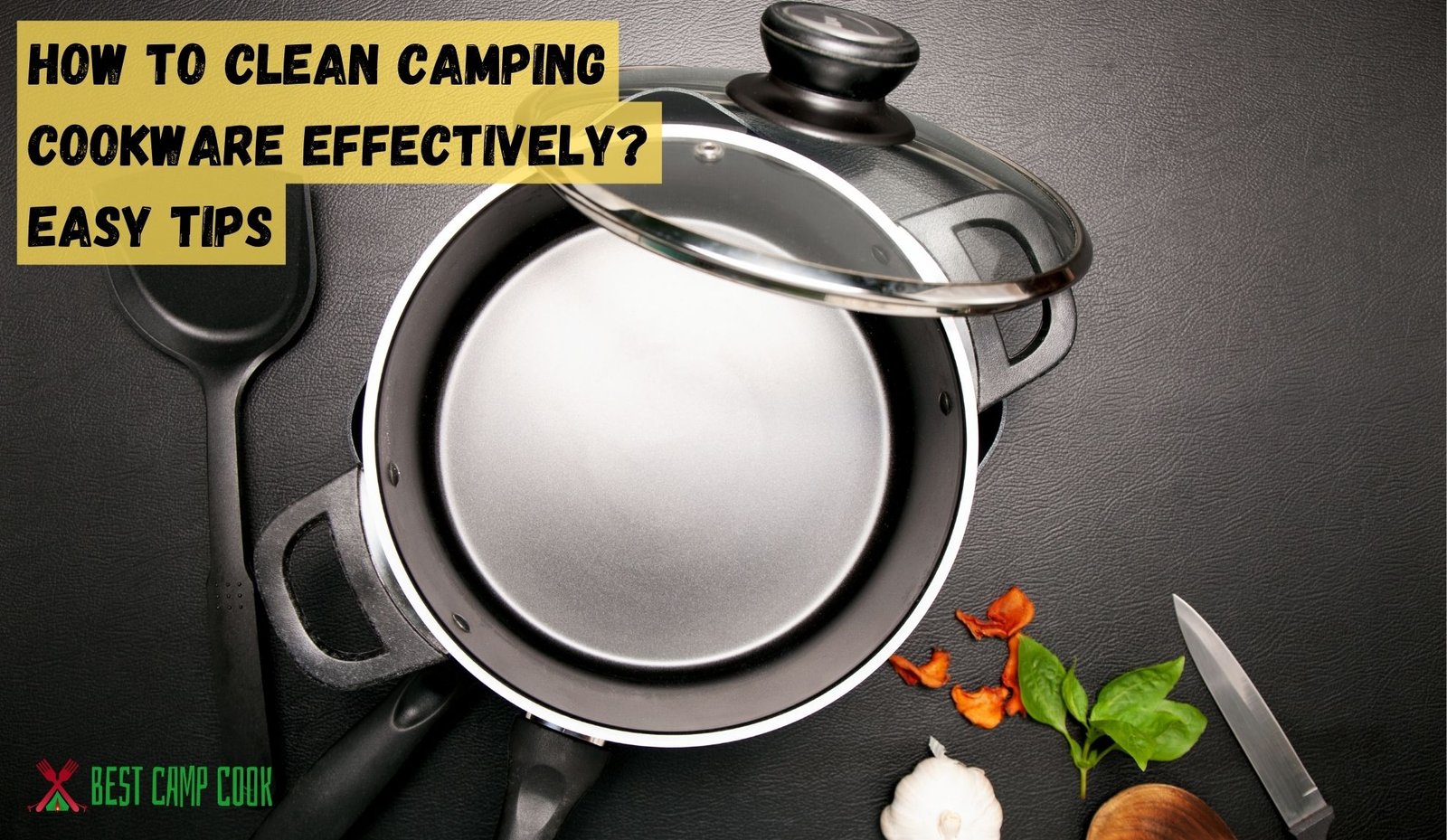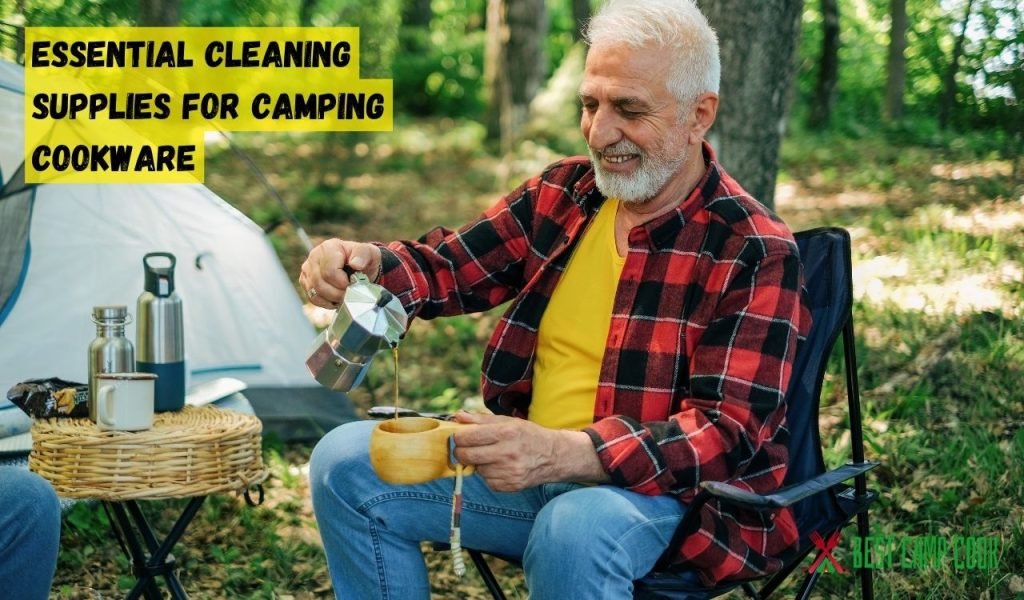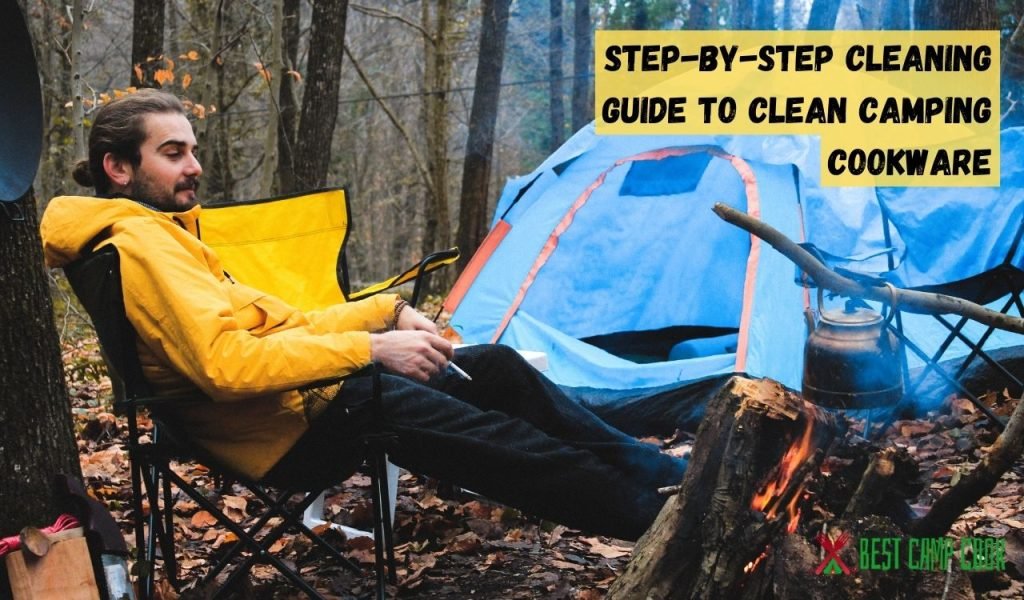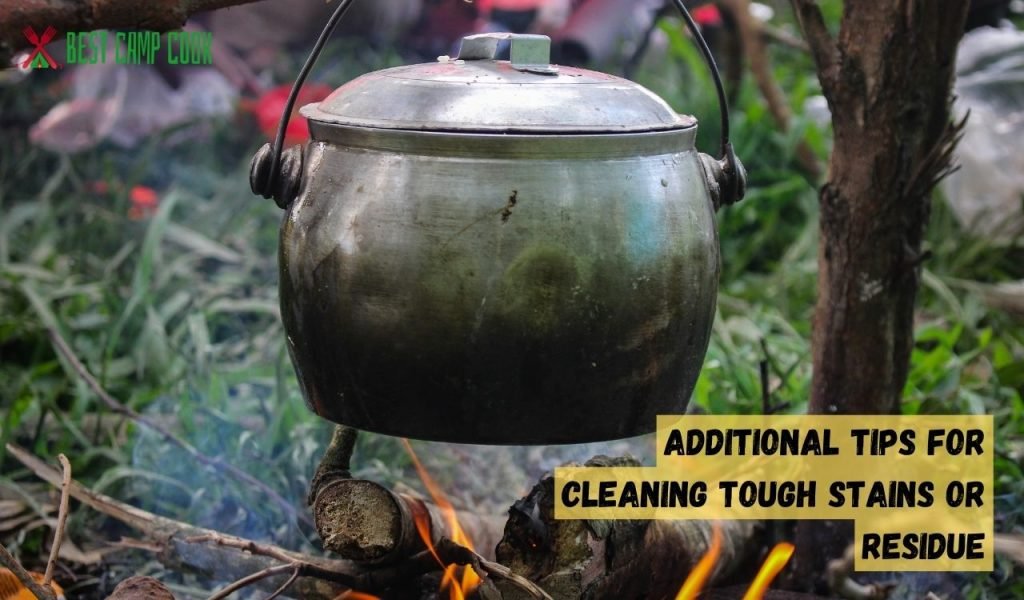Physical Address
304 North Cardinal St.
Dorchester Center, MA 02124
Physical Address
304 North Cardinal St.
Dorchester Center, MA 02124

Ready to conquer the task of cleaning your camping cookware? Look no further! In this concise guide, we’ll unveil the secrets of how to clean camping cookware effectively. Bid farewell to stubborn stains and residue that can dampen your outdoor cooking escapades.
Whether you’re a camping pro or just starting out, our expert tips and tricks will ensure your cookware gleams and shines for your next adventure. Get set to explore hassle-free cleaning techniques that will enhance your camping experience. So, grab your scrub brush and join us on a journey to pristine cookware perfection!
Main Summary: How to Clean Camping Cookware
Master campsite cooking cleanup! After meals, scrub cookware with eco-friendly soap and warm water. For stubborn stains, use baking soda paste. Air dry to prevent rust. Maintain gear for lasting outdoor adventures.
Camping cookware is an essential part of any outdoor adventure. Whether you’re backpacking through the wilderness or enjoying a family camping trip, having clean and well-maintained cookware is crucial for preparing delicious meals.
Additionally, it’s important to consider how much water you will need while camping, as water is not only essential for cooking but also for staying hydrated and maintaining personal hygiene. In this guide, we will delve into the art of cleaning camping cookware, discussing effective techniques and best practices to ensure your gear remains in top-notch condition.
So, let’s roll up our sleeves and dive right into it!

Before we delve into the cleaning process, it’s essential to understand the different types of materials used in camping cookware. Each material has its unique properties and requires specific care. Let’s take a closer look:
Aluminum cookware is lightweight, making it a popular choice among campers. To clean aluminum pots and pans, start by rinsing off any excess food debris.
Then, create a mixture of warm water and mild dish soap. Using a soft sponge or cloth, gently scrub the cookware, paying extra attention to any stubborn stains.
Rinse thoroughly with water and dry it with a clean towel. Avoid using abrasive cleaners or metal scrubbers, as they can scratch the surface.
Stainless steel cookware is known for its durability and resistance to rust. To clean stainless steel camping cookware, begin by rinsing it with warm water.
Next, apply a small amount of dish soap to a soft sponge or cloth and scrub the cookware, focusing on any greasy areas or food residue. Rinse thoroughly and wipe dry with a clean towel.
To remove stubborn stains, you can also create a paste using baking soda and water, gently scrubbing the affected areas.
Cast iron cookware is beloved by many outdoor enthusiasts due to its excellent heat retention properties. Cleaning cast iron requires special attention to maintain its seasoning and prevent rusting.
After cooking, scrape off any food remnants using a spatula or scraper. Avoid using soap, as it can strip away the seasoning. Instead, rinse the cookware with hot water and gently scrub it with a stiff brush or chainmail scrubber.
Dry the cookware thoroughly and apply a thin layer of vegetable oil to prevent rust formation. Store it in a cool, dry place.
Non-stick cookware, often coated with materials like Teflon, provides easy food release and effortless cleaning. When cleaning non-stick camping cookware, it’s crucial to avoid abrasive materials that can damage the coating.
Start by rinsing the cookware with warm water, then use a soft sponge or cloth with a mild dish soap to clean the surface.
Avoid using metal utensils while cooking or cleaning, as they can scratch the non-stick coating. Rinse thoroughly and dry with a towel.
Titanium cookware is known for its lightweight and durable nature. Cleaning titanium camping cookware is relatively simple.
Begin by rinsing off any food particles, then use a sponge or cloth with warm water and mild dish soap to clean the surface.
For stubborn stains, you can create a paste using baking soda and water, gently scrubbing the affected areas. Rinse thoroughly and dry with a clean towel.
By understanding the different materials used in camping cookware and their specific cleaning requirements, you can ensure the longevity and performance of your gear. Now that we have covered the basics, let’s move on to the actual cleaning process.

When it comes to camping cookware, proper cleaning is essential to maintain hygiene and prolong the lifespan of your equipment. Here are the necessary cleaning supplies you should have on hand:
A good quality dishwashing liquid or soap, along with proper technique, is the foundation of any effective cleaning routine when it comes to washing dishes properly. Look for biodegradable options to minimize the impact on the environment
A sturdy scrub brush or sponge is necessary to remove stubborn food residue and grime from your camping cookware. Opt for a brush with firm bristles or a sponge with a scrubbing side.
A microfiber cloth is useful for wiping down surfaces, drying cookware, and polishing stainless steel items. It’s highly absorbent and won’t leave lint behind.
Boiling water is a natural and effective way to sanitize your camping cookware. It helps kill bacteria and remove any remaining dirt or grease.
Invest in a campsite-safe cleaning spray specifically designed for outdoor use. These sprays are typically biodegradable, non-toxic, and safe for the environment.

Cleaning your camping cookware properly ensures that it’s ready for your next outdoor adventure. Follow these step-by-step instructions:
Before cleaning, scrape off any leftover food from your cookware using a utensil or a biodegradable scraper. Dispose of the food scraps appropriately.
Rinse your cookware with warm water to remove loose debris and prepare it for thorough cleaning.
Squirt a small amount of dishwashing liquid onto your scrub brush or sponge. Gently scrub the entire surface of the cookware, paying extra attention to any stubborn stains or burnt-on residue.
After scrubbing, rinse the cookware thoroughly with warm water. Make sure to remove all traces of soap or detergent.
If your cookware is heat-resistant, such as stainless steel or cast iron, fill it with water and bring it to a rolling boil. Let it boil for a few minutes to kill any remaining bacteria or germs. Pour out the hot water carefully.
Wipe the cookware dry with a microfiber cloth or let it air dry completely. Ensure there is no moisture left, as it can lead to rust or unpleasant odors.
Once your camping cookware is clean and dry, store it in a cool, dry place. Avoid stacking items together to prevent scratches or damage during transportation.

Sometimes, camping cookware can develop stubborn stains or residue that require extra attention. Here are some additional tips to tackle tough cleaning challenges:
If you’re dealing with mineral deposits or hard-to-remove stains, create a vinegar soak by mixing equal parts water and white vinegar in a container. Submerge the affected cookware and let it soak for a few hours or overnight. Rinse thoroughly afterwards.
To remove burnt-on residue or tough stains, make a paste by mixing baking soda with a small amount of water. Apply the paste to the problem areas and let it sit for a while. Scrub gently with a sponge or brush and rinse thoroughly.
If your cookware has rust spots or discoloration, squeeze fresh lemon juice onto the affected areas and sprinkle some salt over it. Use a scrub brush or sponge to gently scrub the stains. Rinse well and dry.
For non-stick cookware or items with delicate surfaces, avoid using abrasive cleaners or harsh scrubbing tools that can damage the coating. Look for non-abrasive cleaners specifically designed for these types of cookware.

Taking proper care of your camping cookware not only ensures cleanliness but also helps extend its lifespan. Consider these tips for maintenance:
If you have cast iron cookware, it’s important to season it regularly to prevent rust and maintain its non-stick properties. Follow the manufacturer’s instructions or apply a thin layer of vegetable oil to the entire surface and bake it in the oven for a designated time and temperature.
When cooking with non-stick or enamel-coated cookware, avoid using metal utensils that can scratch or damage the surface. Opt for silicone, plastic, or wooden utensils instead.
When storing camping cookware, ensure it is completely dry to prevent mold or mildew growth. Store items in their original packaging or use protective sleeves or bags to prevent scratches and dents. Keep them in a secure, dry place to avoid exposure to moisture.
Periodically inspect your camping cookware for any signs of damage, such as chips, cracks, or loose handles. Address these issues promptly to prevent further deterioration and potential safety hazards.
Always refer to the manufacturer’s instructions for specific care and maintenance guidelines for your cookware. Different materials and coatings may have specific requirements, and following these instructions will help ensure optimal performance and longevity.
To clean camping pots, start by rinsing off any excess food particles. Fill the pot with warm water and add a small amount of dish soap.
Scrub the pot using a non-abrasive sponge or cloth, paying extra attention to any stubborn stains.
Rinse the pot thoroughly with clean water and allow it to dry before storing.
Cleaning a burnt camping pan requires some extra effort. Fill the pan with water and add a generous amount of baking soda.
Place the pan on low heat and let it simmer for about 15 minutes. Remove the pan from heat and allow it to cool.
Scrub the pan with a non-abrasive sponge or brush to remove the burnt residue. Rinse well and repeat if necessary.
For deep cleaning dirty pots, create a mixture of equal parts water and vinegar. Bring the solution to a boil in the pot and let it simmer for a few minutes.
Turn off the heat and add a tablespoon of baking soda. The mixture will bubble and help lift off stubborn stains.
Use a sponge or brush to scrub the pot, paying attention to the bottom and sides. Rinse thoroughly and dry before use.
Cleaning metal pots is relatively straightforward. Start by rinsing off any loose debris or food particles.
Fill the pot with warm water and add a small amount of dish soap. Use a non-abrasive sponge or cloth to scrub the pot, paying attention to any areas with stubborn stains or residue.
Rinse thoroughly with clean water and dry the pot before storing.
Yes, vinegar can be an effective natural cleaner for pots. Its acidic properties help break down stains and remove buildup.
To clean pots with vinegar, mix equal parts white vinegar and water in the pot. Bring the mixture to a simmer and let it sit for a few minutes.
Then, use a sponge or brush to scrub the pot and remove any remaining stains. Rinse thoroughly with water after cleaning.
Yes, biodegradable soap is generally safe for camping. Biodegradable soaps are designed to break down naturally and have minimal impact on the environment.
They are formulated to be eco-friendly and are often recommended for outdoor activities such as camping.
However, it’s still important to follow Leave No Trace principles and use biodegradable soap sparingly, keeping in mind the potential impact on local ecosystems.
One of the best solutions to clean pots is a mixture of warm water, dish soap, and a non-abrasive sponge or cloth. This combination helps to remove grease, food residue, and stains effectively.
For stubborn stains or burnt-on food, you can also use a solution of water and baking soda or vinegar. These natural cleaners can help break down tough stains and make the cleaning process easier.
Remember to rinse the pots thoroughly after cleaning to remove any cleaning agents before use.